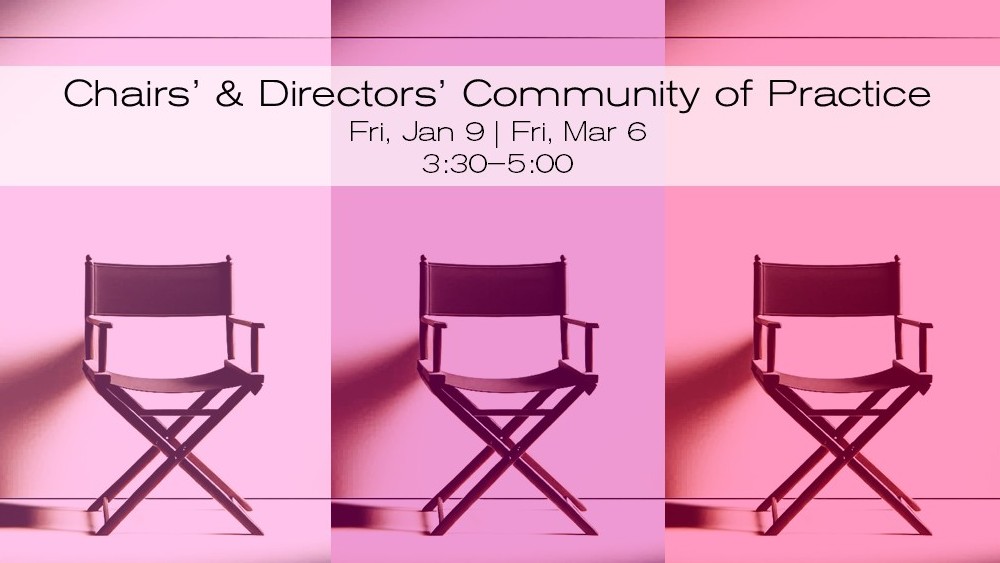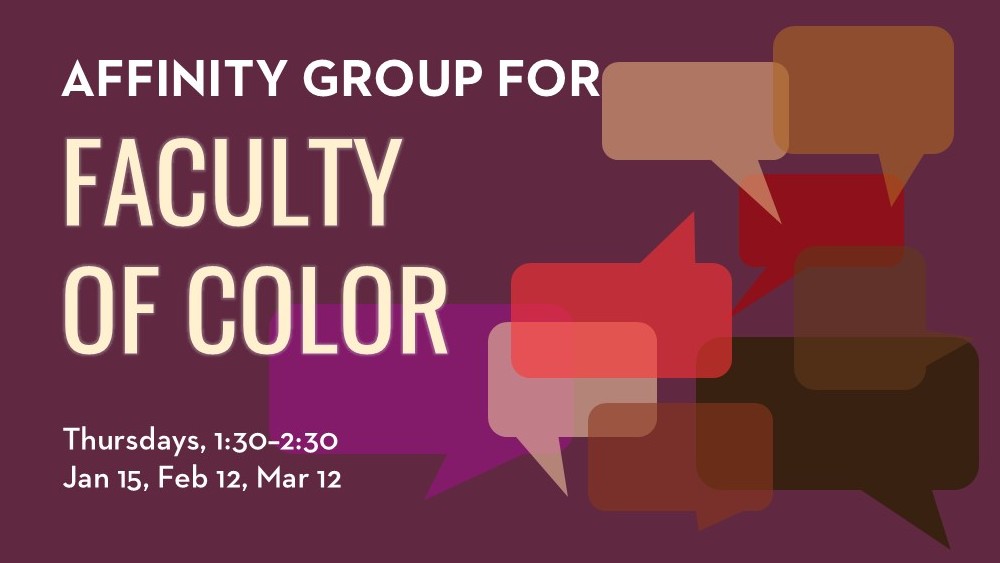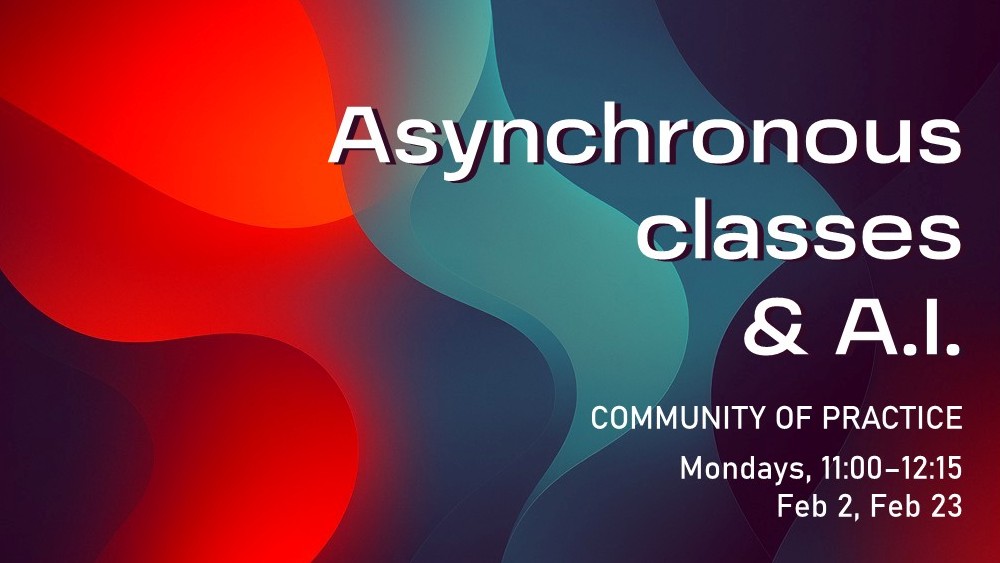Events
Find out what Faculty Development events are on this term and sign up

One of our goals as a Center is to engage SU faculty in conversation around the deeper questions of academic practice, based on national and international research into higher education.
Events are open to ALL SU faculty. Check the callout boxes to the right of each event for further details around audience and modality.
You can register for this quarter's sessions here or by following the links listed with each event.
You can also download a flyer of all these sessions to post on your wall or door:
26WQ What's happening
Community of Practice

Fri, Jan 9 and Fri, Mar 6 | 3:30–5:00
Facilitated by David Green and Katherine Raichle
The Chairs' and Directors' Community of Practice is open to all current department chairs and program directors, as well as chairs- and directors-elect.
We gather twice per quarter.
Further details are available on the Community of Practice page here.
» Register (separate registration form from other events)
Modality: Hyflex (in-person and online)
For: Current department chairs and program directors, plus chairs- or directors-elect
Affinity group

Thursdays: Jan 15, Feb 12, Mar 12 | 1:30-2:30 | Via Zoom | Zoom link provided upon registration
Co-sponsored by CFD and the Office of Diversity and Inclusion
Facilitated by Colette Hoption (Center for Faculty Development; Management Department)
Being a faculty member of color in academia often comes with unique challenges—both visible and invisible. From navigating institutional culture to managing racialized experiences around teaching, research, and service, there is a need for supportive community. In response, the Center for Faculty Development is offering an affinity group for faculty of color. Members of this group will have space to connect, reflect, and build relationships with colleagues who share similar experiences. In this space, we will affirm one another, exchange strategies for success, and foster resilience.
Why an affinity group?
Affinity groups bring together individuals around shared identities and lived experiences, offering vital psychological and professional benefits. These include reduced feelings of isolation, increased confidence, and a stronger sense of belonging. Professionally, participants often gain access to informal mentoring, shared strategies for career advancement, and a deeper understanding of how to navigate institutional systems. For faculty of color, such groups create space for affirmation, collective insight, and solidarity. Research shows they contribute to well-being, empowerment, and sustained engagement in academic life.
Aims of the group
Our aim is to provide an environment that supports faculty of color success and satisfaction in academic life.
» Register
Modality: Online
For: Faculty of color (full- or part-time)
Launch meeting

Tue, Jan 20 | 4:00–4:30
Co-sponsored by CFD and the Office of Research and Sponsored Projects
Facilitated by Andrea Verdan (Center for Faculty Development; Chemistry Department)
The “research on research” gives us good evidence on what helps faculty progress with their research, and in response, we’ve been launching Faculty “Writing” Groups since 2007. “Writing” encapsulates whatever is involved from the inception of your idea to the completion of the final “product.” These groups provide you with camaraderie and accountability to achieve more in your scholarship. And they are intentionally interdisciplinary so that you remain the expert in your own field throughout.
By the end of this session, you will be grouped with two or three other colleagues from across campus and will be ready to meet with your group independently and regularly to help you achieve more in your research – and with less stress.
Click here for our webpage with full details on Faculty "Writing" Groups.
» Register
Modality: Online
For: All faculty (full- and part-time)
Community of Practice

Wednesdays, 9:30–10:45 | Jan 21, Feb 11 | Loyola 201 and Zoom (Link to follow on registration)
Co-sponsored by CFD, Technology Ethics Initiative, Lemieux Library, Instructional Design Studio (formerly CDLI), and University Core
Facilitated by Julie Homchick Crowe (Department of Media & Communication; Provost Fellow for A.I. & Pedagogy) and Katherine Raichle (Psychology Department and Center for Faculty Development)
With the rise in generative AI use among college students, faculty are re-thinking how they structure their in-person meetings, evaluate learning, and assign homework. While some have returned to blue books and oral exams, others are centering generative AI as part of their courses and their students’ work. How are these approaches working? How can we approach teaching and best use the resources we have as instructors of in-person classes?
If any of those questions resonate, this space is for you! We will provide an informal venue for those who desire conversation and support from colleagues to share ideas, practices, and challenges with AI.
How does a "Community of Practice" work?
For these gatherings, we use the "Communities of Practice" model (Wenger 1998), which means you're in charge of what's discussed. You decide which topics are most important for you as teachers who are grappling with the changing landscape of teaching in this new age of AI.
Each member of the group decides how much or how little to contribute. (For example, the model includes "legitimate peripheral participation" to acknowledge that not everyone wants to join in a discussion even when they choose to attend. Rather, they may choose to simply listen to others).
This community of practice provides an intentionally loose structure for sharing ideas and working out approaches to new challenges as they arise. Moreover, communities of practice create opportunities to forge new connections across colleges and disciplines for ongoing support.
The Center for Faculty Development's role is simply to facilitate the process for you. We also compile anonymized notes and ideas from each session to share with participants.
As with other events run by the Center, this forum is voluntary, formative, and confidential.
» Register
Modality: Hyflex (in-person and online)
For: All faculty teaching in-person courses
Research practice

Wednesdays: Jan 21, Feb 11, Mar 4 | 11:00-12:00 | Loyola 201
Co-sponsored by CFD and the Office of Research and Sponsored Projects
Facilitated by Colette Hoption (Center for Faculty Development; Management Department)
"Write-on-sites" are ideal for faculty looking to make steady progress on scholarly or creative projects. These sessions are especially helpful for those looking for uninterrupted time, benefit from gentle accountability, and/or feel isolated in their work. Whether you’re drafting a manuscript, creating artwork, revising an article, developing a grant proposal, or advancing any long-term research or creative endeavor, these sessions offer a professional space to help you move your work forward.
What will we do?
At every session, you will decide your goals for the hour. In our shared space, you will have your own desk space to work independently. Sessions end with an optional time to connect with others on their progress.
What's the time commitment?
Three 1-hour sessions during Winter Quarter.
» Register
Modality: In-person
For: All faculty (full- or part-time)
Workshop

Thu, Jan 22 | 12:00-1:30 PM | Zoom (Link to follow on registration)
Co-sponsored by CFD, Center for Jesuit Education, and University Core
Facilitated by Lydia Cooper (University Core/English), Yancy Dominick (CJE/Philosophy), and Andrea Verdan (CFD/Chemistry)
This workshop invites faculty who are new to Jesuit education to engage in conversation about teaching and learning at a 21st-century Jesuit university.
We will explore practical teaching approaches for use in any discipline that foster personal and cooperative insight, discovery, creativity, and reflection to promote life-long learning and the formation of leaders for a just and humane world, consistent with SU’s Jesuit educational mission.
Participants will receive pedagogical tools that they can use this quarter, as well as share with colleagues effective teaching strategies and questions that have arisen in their time at SU.
All are welcome; visiting faculty, instructors, adjuncts, and lecturers are especially welcome to attend. We understand that this timing may conflict with your teaching schedule, so we will offer flexibility for you to attend this session. Please feel free to come when you can and leave when you must.
» Register
Modality: Online
For: All instructors and adjunct (part-time) faculty
Faculty Learning Community

Tuesdays, 10:30–11:45 | Jan 27, Feb 10, Feb 24 | LOYA 201 and Zoom (Link provided on registration)
Co-sponsored by CFD, Technology Ethics Initiative, Lemieux Library, Instructional Design Studio (formerly CDLI), and University Core
Facilitated by Julie Homchick Crowe (Communication & Media Department; Provost Fellow for AI and Pedagogy) and Andrea Verdan (Chemistry & Center for Faculty Development)
Are you concerned about AI and academic integrity, but tired of playing "gotcha" with students?
In this learning community we'll read The Opposite of Cheating, a book inviting us to take a different approach—rather than focusing on detecting dishonesty, we'll explore evidence-based strategies for designing assignments and courses where integrity becomes the natural path to success. From the publisher:
“The Opposite of Cheating presents a positive, forward-looking, research-backed vision for what classroom integrity can look like in the GenAI era, both in cyberspace and on campus. Bertram Gallant and Rettinger provide practical suggestions to help faculty revise the conversation around integrity, refocus classes and students on learning, reconsider the structure and goals of assessment, and generally reframe our response to cheating. At the core of this strategy is a call to rethink how we “show up” for students, and to reinforce and fully support quality teaching, learning, and assessment.”
Who is it suited to?
This community is open to faculty across all disciplines and experience, teaching in any mode of instruction. In our three-sessions, facilitated by Julie Homchick Crowe and Andrea Verdan, we’ll jointly
- explore realistic strategies for designing for integrity in the age of AI,
- engage in reflective dialogue about the evolving role of AI in education, and
- build community and share insights with colleagues facing similar questions about AI in teaching and learning.
20 places are available.
The Opposite of Cheating is 274 pages long, and the reading will be split across the three sessions to be manageable for participants.
» Register
Modality: Hyflex (In-person and online)
For: All faculty (full- and part-time)
Candid Conversation

Wed, Jan 28 | 11:00–12:15 | Loyola 201 and Zoom
Co-sponsored by CFD, Center for Jesuit Education, Technology Ethics Initiative, Lemieux Library, Instructional Design Studio (formerly CDLI), and University Core
Facilitated by Julie Homchick Crowe (Department of Media & Communication; Provost Fellow for Pedagogy and AI), and Katherine Raichle (Psychology Department and Center for Faculty Development)
As AI becomes increasingly present in our classrooms, whether intentionally integrated into curricula or used by students without permission, we face a complex set of ethical considerations. Faculty and students globally express ethical concerns about AI related to environmental impact, degradation of critical thinking skills, academic honesty, and more – and yet, we are asked to grapple with how to prepare students for a world where AI is quickly becoming unavoidable.
Join colleagues from across the university for a candid conversation on the evolving landscape of AI use and ethics in higher education. This session invites faculty to explore these tensions together, share experiences, and reflect on how we might navigate the balance between ethical responsibility and educational necessity.
“Candid conversations” are designed to surface a diversity of views and perspectives and to collectively hold tension as we grapple with topics that don’t offer easy answers.
Our candid conversation format has a specific structure:
- We will first briefly introduce you to the topic, including an overview of the ethics and use of AI in Higher Education.
- We will then devote the remainder of our time to group discussion about this tension.
- We will end with individual reflections and sharing about the values that inform if and/or when you may use AI in your particular course(s).
All faculty are welcome, regardless of individual teaching modality (in-person or online).
» Register
Modality: Hyflex (in-person and online)
For: All faculty (full- and part-time)
Community of Practice

Mondays, 11:00–12:15 | Feb 2, Feb 23 | Zoom (Link to follow on registration)
Co-sponsored by CFD, Technology Ethics Initiative, Lemieux Library, Instructional Design Studio (formerly CDLI), and University Core
Facilitated by Julie Homchick Crowe (Department of Media & Communication; Provost Fellow for A.I. & Pedagogy) and Katherine Raichle (Psychology Department and Center for Faculty Development)
Generative AI is posing unique challenges for those of us who are teaching asynchronous online courses. How do we reassure ourselves that the learning is happening when direct contact with students is not possible? How do we reinforce how and when AI may be used – and know when or whether our policies are being followed? What's working and what isn't?
If any of those questions resonate, this space is for you! It provides an informal venue for those who desire conversation and support from colleagues to share ideas, practices, and challenges with AI.
How does a "Community of Practice" work?
For these gatherings, we use the "Communities of Practice" model (Wenger 1998), which means you're in charge of what's discussed. You decide which topics are most important for you as teachers who are grappling with the changing landscape of teaching in this new age of AI.
Each member of the group decides how much or how little to contribute. (For example, the model includes "legitimate peripheral participation" to acknowledge that not everyone wants to join in a discussion even when they choose to attend. Rather, they may choose to simply listen to others).
This community of practice provides an intentionally loose structure for sharing ideas and working out approaches to new challenges as they arise. Moreover, communities of practice create opportunities to forge new connections across colleges and disciplines for ongoing support.
The Center for Faculty Development's role is simply to facilitate the process for you. We also compile anonymized notes and ideas from each session to share with participants.
As with other events run by the Center, this forum is voluntary, formative, and confidential.
» Register
Modality: Online
For: All faculty teaching asynchronous courses